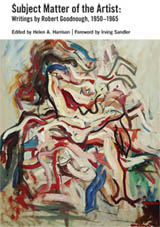“As a painter and as one interested in education in relation to painting and drawing, the writer has become personally interested in the problem of subject matter in art. . . . Since there is controversy in regards to this tendency in painting, research directed toward the source of ideas involved in the work, it is felt, will help to make clear the intention of the artists. This research will deal with the attitudes of these artists toward their own work and their relation to tradition as they express it.” —Robert Goodnough (1950)
The absence of traditional subject matter was a primary issue for painters in mid-twentieth-century America whose imagery lacked representational references; it was also a problem for those struggling to understand modern art. Robert Goodnough (1917–2010), then a New York University graduate student and an artist deeply involved with these issues, responded to the situation in a 1950 research paper, “Subject Matter of the Artist: An Analysis of Contemporary Subject Matter in Painting as Derived from Interviews with Those Artists Referred to as the Intrasubjectivists.” Goodnough’s paper constitutes the first scholarly work on the artists who became known as the Abstract Expressionists and includes interviews with William Baziotes, Willem de Kooning, Adolph Gottlieb, Robert Motherwell, Barnett Newman, Jackson Pollock, and Mark Rothko. This previously unpublished study is presented here for the first time alongside related writings by Goodnough.

